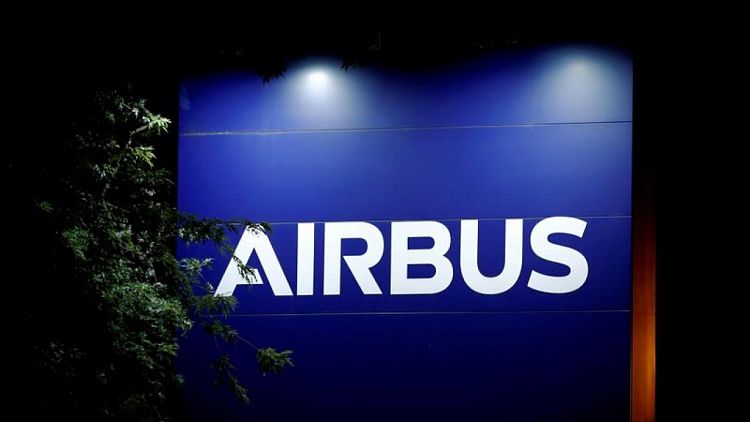By Tim Hepher
PARIS - Airbus is set to deliver more than 600 jets this year after a strong first half driven in part by deals that allow some carriers to delay accounting for new planes on their balance sheets, industry sources said.
The financial structures are part of a raft of innovations and compromise deals thrashed out by the European planemaker as it tries to keep cash rolling in during the pandemic.
Most analysts expect the recent delivery trend to contribute to solid first-half results on Thursday.
Airbus has predicted full-year deliveries at least equivalent to last year's total of 566, down 34% from 2019.
In this year's first half, Airbus delivered 297 aircraft after a surge in June, putting it on course to exceed full-year targets given its pattern of speeding deliveries late in the year, according to industry sources and some analysts.
Internally, the planemaker is provisionally aiming for more than 600 deliveries this year, several sources said.
Deliveries are vital for aerospace companies because they mark the point at which the bulk of a jet's value - ranging from $40 million or more - reaches the manufacturer's coffers and help defray huge development costs.
The task of keeping up deliveries has emerged as the number one priority for Airbus' commercial and financing teams, previously focused on winning ever-more multi-billion-dollar plane deals.
Traditional order hype at now-cancelled air shows has given way to concerns about whether planes announced at previous events will be delivered, particularly among southeast Asian carriers widely said to have over-ordered jets in the past.
At the same time, Airbus faces increased demand for planes like the best-selling A321neo in later years, because of the woes facing rival Boeing's recently grounded 737 MAX and a tide of planes pushed back this year to delivery dates mid-decade.
To ensure deliveries, Airbus has, in some cases, agreed advances to carriers, delivery deferrals and, in several cases, financial deals allowing cash payments to be decoupled from the transfer of ownership, at least temporarily, industry sources said.
Under these so-called advance delivery agreements, Airbus is paid virtually in full but the asset may not immediately wind up on the airline's books, delaying the point at which it must start absorbing depreciation charges on its bottom line.
The aircraft is meanwhile temporarily stored.
Sources said the mechanism, which can involve financial third parties, has been approved by auditors because it includes an irrevocable commitment to transfer ownership of the aircraft at a specific date, while Airbus receives enough to book a sale.
Airbus had no immediate comment.
DELIVERY NEGOTIATIONS
Airbus and other manufacturers have also scrambled to simplify deliveries and in some cases offered to fly planes to airlines unable to send pilots due to travel restrictions.
Chief Commercial Officer Christian Scherer told reporters in June that Airbus had fewer than five aircraft left without homes after month of crisis management with airlines, having reached out to customers as soon as lockdown paralysed demand.
Rival Boeing posted its first quarterly profit in almost two years on Wednesday, as deliveries of its 737 MAX also gained traction.
Even so, negotiations can be tough and more "contractual" than in the past, suspending the often clubby atmosphere of an industry dependent on long-term relationships, sources said.
"If you have a plane in production now, the pressure to take delivery is huge. If you have a delivery in the middle of the decade, Airbus would be happy for you to release it so that it can offer that slot to someone else," a senior financier said.
In one compromise, Airbus booked an order for five A350 wide-bodied jets from Lufthansa in June, while simultaneously agreeing to cancel three previous orders. One source said the new order involved rowing back on earlier cancellation rights.
The order reshuffle was part of a fleet restructuring that also saw Lufthansa buy five more competing Boeing 787s.
Lufthansa denied, however, a media report that its chief executive Carsten Spohr had clashed by video call with his Airbus counterpart over payments for aircraft. Such matters are not typically discussed at CEO level, a spokesman said.
"There are always tough negotiations, but we have a good underlying partnership," he added.



